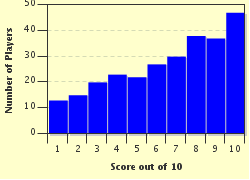Quiz Answer Key and Fun Facts
1. As World War II came to an end only three nations in the whole of the African continent were fully independent. Which of the following was not among them?
2. Despite allowing the jewel in its imperial crown, India, to gain independence in 1947, Britain demonstrated that it had no intention of allowing the same to happen in Africa. The strategic importance of the Suez canal meant that the grip Britain held on Egypt was one that it was particularly reluctant to loosen. However, in 1956, Egypt determined to seize control of its own affairs by nationalising the canal. Who was the Arab nationalist leader who resisted British, French and Israeli military and political collusion to guide his country to full self-determination?
3. The rush for independence began with the first granting of independence to one of Britain's sub-Saharan African colonies. Which West African country, relatively prosperous from its export of cocoa and gold, became the role model for African independence when Kwame Nkrumah became its first independent leader in 1957?
4. When Charles de Gaulle offered a referendum on independence to the eight nations of French West Africa and the four nations of French Equatorial Africa, only one chose to take the path of secession. Which country's 95% yes vote led to a declaration of independence in the capital Conakry just four days later?
5. While the European powers struggled to maintain their African empires, one African country freed itself from Italian occupation and began to develop an empire of its own. It assumed control of its immediate neighbour, Eritrea, by dint of the vague claim that part of Eritrean territory had been part of its ancient kingdom. What country's emperor laid this claim?
6. Few handover ceremonies were conducted with such acrimony as that which took place in the Congolese capital on 30 June 1960. As the representative of the outgoing colonial power, King Baudouin I of Belgium praised the "genius" of his predecessor, after whom the capital was named. In response, the outraged Prime Minister, Patrice Lumumba, railed against the "cruel and inhuman... oppression and injustice" foisted upon his people by their soon-to-be former rulers. In which city did this bitter war of words take place?
7. When the scramble for Africa took place in the late 19th century, one nation found itself split into five territories, controlled by France, Italy, Britain and one of its eastern African neighbours. On gaining independence, the British and Italian territories were re-combined and the new country adopted a five-pointed star on its flag to represent the five territories that it wished to bring back together. Which country failed in its attempts at reconciliation and slid into anarchy in the late 1990s?
8. In the early 1970s only one European, fully colonial power was left in the whole continent of Africa. Following a coup d'etat in its European homeland in 1974, the new regime decided that the African colonies were no longer of any strategic or trading importance. The transfer of power to local governments began in peaceable fashion in Guinea-Bissau, six months after the revolution. The later, and messier, exits from Mozambique and Angola led, almost immediately, to prolonged and bitter civil wars. What was the last European colonial power to exit Africa in 1975?
9. As the 1990s began, even with the Europeans gone, one country remained without its independence. Colonised by Germany in 1884, it came under the control of South Africa in 1920 after German defeat in World War I. It wasn't until South Africa began its own process of moving towards majority rule that the country known as South West Africa was given the opportunity to govern its own interests. With Sam Nujoma as its first president, which country finally gained full independence in 1990?
10. In 1990, as the Soviet Union began to unravel at home, it withdrew its support from many regimes throughout Africa. Many dictators were forced into compromises, into elections and, sometimes, into exile. By that year, nearly four decades since the first countries were granted their independence from European colonial powers, how many African leaders had been democratically voted out of office?
Source: Author
Snowman
This quiz was reviewed by FunTrivia editor
bloomsby before going online.
Any errors found in FunTrivia content are routinely corrected through our feedback system.

